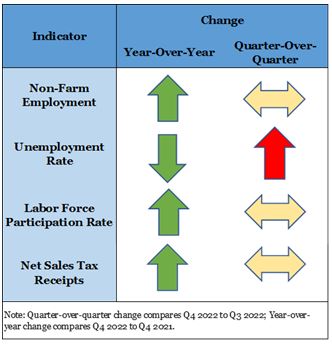
PROVIDENCE – Rhode Island’s economic growth stalled in the fourth quarter of 2022 and continues to lag both the region and nation, according to a report from the Rhode Island Public Expenditure Council and the Center for Global and Regional Economic Studies at Bryant University.
The Rhode Island Key Performance Indicators Quarterly briefing, published on Tuesday, reported there were no quarter-over-quarter changes in three of four core economic indicators in Rhode Island: non-farm employment, labor force participation rate, and net sales tax receipts, despite all four, including unemployment, improving year over year.
“Rhode Island’s economy has improved over last year, but we saw very little change – positive or negative – in most key economic indicators for the fourth quarter of 2022,” said RIPEC CEO and President Michael DiBiase. “While experiencing little change this quarter, Rhode Island’s economic trajectory continues to lag behind New England and the U.S., highlighting a need for the state to sharpen its focus on economic development and improving the business climate.”
There were 8,100 fewer Rhode Island-based jobs in the fourth quarter of 2022 than before the pandemic, according to the report. The state has regained 90.8% of all jobs lost during the pandemic, somewhat lower than the rest of New England at 91.7%.
The number of employed Rhode Islanders increased by 6,100 over pre-pandemic levels, even as employment fell by 1,900 in the fourth quarter year over year, data showed. The number of unemployed Rhode Islanders increased significantly, by 3,700 quarter over quarter, as the state’s labor force participation rate marginally increased from 63.7% to 63.8%.
Rhode Island’s unemployment rate of 3.5% in the fourth quarter was up from 2.9% the previous quarter and on par with the regional and national rate.
Net sales tax receipts decreased 0.5% quarter over quarter but increased 4.4% year over year.
Rhode Island experienced job losses in transportation and utilities; professional and business services; leisure and hospitality; and government. Leisure and hospitality shed 1,700 jobs, which was the largest drop quarter over quarter, according to the report.
Construction experienced the largest quarter-over-quarter gain, adding 1,000 jobs.











